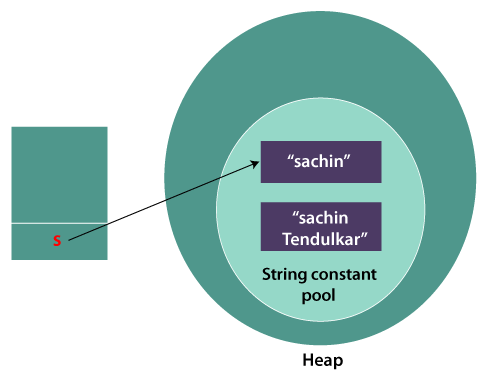What Is Unalterable Strings and Just How It Works
In the realm of programs, recognizing the concept of unalterable strings is paramount for developing durable and safe and secure applications. Unalterable strings refer to strings that can not be changed after they are created, making sure data honesty and predictability within the code. This essential principle plays a vital function in various programs languages and uses an one-of-a-kind technique to handling information. By exploring the complexities of exactly how immutable strings work, one can uncover a globe of advantages and opportunities that can boost the high quality and efficiency of software development.
The Basics of Immutable Strings
Unalterable strings, as a fundamental concept in shows, are personality sequences that can not be altered as soon as they are produced. This indicates that once a string is appointed a worth, that value can not be modified. In languages like Python and Java, strings are immutable objects, causing various ramifications in terms of memory administration and information stability.
One of the vital advantages of immutable strings is that they provide a sense of protection in data manipulation. Because the web content of an unalterable string can not be customized, it ensures that the initial data continues to be undamaged, decreasing the threat of unintended modifications throughout program execution (Why are strings immutable in Java?). This residential or commercial property also streamlines debugging procedures, as designers can rely on that when a string is specified, its worth will not be unintentionally changed
When a new string is created based on an existing one, rather than customizing the initial string, the brand-new value is kept independently. On the whole, comprehending the fundamentals of unalterable strings is essential for grasping programs concepts and maximizing code effectiveness.
Advantages of Unalterable Strings
Structure upon the protection and effectiveness advantages of immutable strings, their advantages include improving code dependability and streamlining simultaneous programs tasks. By being immutable, strings can not be modified after development, which eliminates the risk of unintentional adjustments in the data they keep. This fundamental immutability ensures that as soon as a string is developed, its worth stays constant throughout the program's implementation, minimizing the possibilities of pests brought on by unforeseen alterations.
Additionally, unalterable strings add to code integrity by making it much easier to reason about the state of a program. Given that strings can not be transformed, designers can rely on that a string will constantly hold the exact same value, simplifying debugging and maintenance initiatives. This predictability brings about more reputable and steady codebases.

Implementation in Programs Languages
Within visit homepage different programs languages, the incorporation of unalterable strings is an essential facet that influences just how data is dealt with and manipulated within code frameworks. The execution of unalterable strings differs throughout various programming languages, with each language supplying its own devices to sustain this concept.

On the other hand, languages like C and C++ do not have built-in assistance for unalterable strings. Developers in these languages must manually apply immutability by applying policies within their code to avoid direct alterations to string items.
Ideal Practices for Dealing With Immutable Strings
When taking care of unalterable strings in programming languages like Java and Python, sticking to finest practices guarantees secure and reliable information control. Among the essential finest methods see this site is to use StringBuilder or StringBuffer as opposed to straight manipulating strings, particularly when managing substantial concatenation operations. These classes give mutable choices for string control, aiding to stay clear of unnecessary memory allocations and improving performance.
An additional ideal practice is to make use of string interpolation or format functions supplied by the language as opposed to hand-operated concatenation. This not just enhances readability yet also aids in protecting against usual pitfalls such as unintentional string modifications. In addition, when working with sensitive data such as passwords or API tricks, it is essential to avoid storing them as ordinary text in immutable strings. Making use of secure storage systems like char ranges or specialized collections for handling sensitive info assists alleviate protection threats connected with unalterable strings.
Real-world Applications and Examples
Checking out sensible applications of unalterable strings in different markets discloses their significant effect on information honesty and system dependability. In the health care sector, unalterable strings play a vital role in guaranteeing the protection and privacy of person information. By protecting against unauthorized alterations to sensitive details such as medical records and prescriptions, unalterable strings assist maintain compliance with strict personal privacy policies like HIPAA.
Banks likewise gain from the unalterable nature of strings to improve the security of customer data and transaction documents. Immutable strings aid stop fraud and unauthorized modifications to financial details, providing a robust defense against cyber dangers and making certain the count on and confidence of clients.

Conclusion
In verdict, immutable strings are dealt with and stable sequences of personalities that supply advantages such as string safety and boosted Full Article performance in programming. They are carried out in numerous shows languages to guarantee information stability and protection. Finest practices for dealing with immutable strings consist of staying clear of straight alterations and using methods that return new string things. Real-world applications of unalterable strings consist of data encryption, caching, and string manipulation tasks.
Immutable strings refer to strings that can not be altered after they are developed, making certain data integrity and predictability within the code. When a brand-new string is created based on an existing one, instead than customizing the original string, the new value is kept individually.In languages like Java and Python, strings are unalterable by default, suggesting that when a string things is developed, its worth can not be transformed - Why are strings immutable in Java?. Ideal methods for functioning with unalterable strings include preventing direct adjustments and using techniques that return new string items. Real-world applications of immutable strings consist of information encryption, caching, and string control tasks